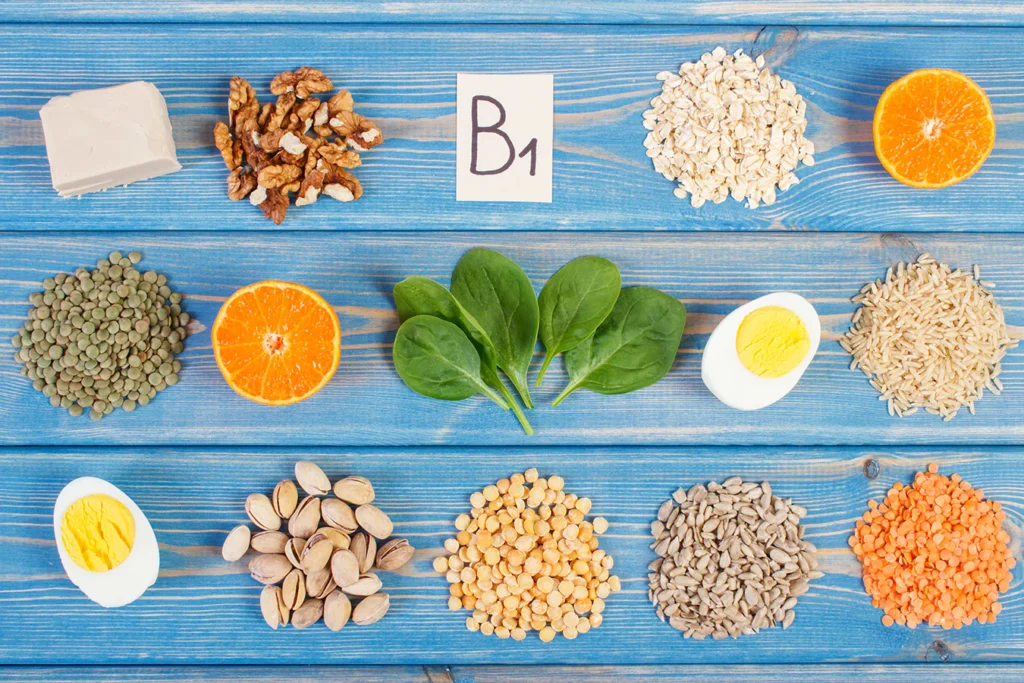In the quest for optimal health and boundless energy, the role of essential nutrients cannot be overstated. Among these vital nutrients, Vitamin B1, also known as Thiamine, stands out as a key player in maintaining overall well-being and vitality. From supporting energy metabolism to neurological health, Vitamin B1 (Thiamine) plays a crucial role in numerous bodily functions. In this comprehensive guide, we’ll explore the importance of thiamine, its sources, recommended intake, supplements, and its impact on energy and neurological health.
Understanding Vitamin B1
Vitamin B1 (thiamine), a water-soluble vitamin, is essential for converting carbohydrates into energy, supporting proper nerve function, and maintaining a healthy metabolism. It plays a vital role in the synthesis of neurotransmitters and the production of energy at the cellular level.
Importance of Vitamin B1 (Thiamine) for Optimal Health and Energy
Thiamine is an essential nutrient that the body requires for converting carbohydrates into energy. It serves as a cofactor for several enzymes involved in energy metabolism, making it indispensable for maintaining vitality and stamina. Without an adequate supply of thiamine, the body’s ability to produce energy diminishes, leading to fatigue and reduced physical performance.
Common Signs and Symptoms of Vitamin B1 (Thiamine)Deficiency
Vitamin B1 (Thiamine) deficiency can manifest in various ways, affecting both physical and mental well-being. According to American Journal of Food Science and Health people who do not consume enough thiamine may experience poor appetite, weight loss, confusion, memory loss, muscle weakness or cardiovascular symptoms . In severe cases, thiamine deficiency can lead to conditions like beriberi and Wernicke-Korsakoff syndrome, characterized by neurological disturbances and cardiovascular abnormalities.
Food Sources of Vitamin B1 (Thiamine)

Fortunately, thiamine is readily available in a variety of foods. Excellent dietary sources include whole grains, such as brown rice, oats, and whole wheat bread, legumes like beans and lentils, nuts and seeds, lean meats like pork and poultry, fish, and fortified cereals. Incorporating these foods into your diet can help ensure an adequate intake of thiamine.
Recommended Daily Intake of Vitamin B1 (Thiamine)
The recommended daily intake of thiamine varies depending on factors such as age, gender, and physiological status. An adult man should aim for 1.2 mg of thiamine, while adult woman needs 1.1 mg and pregnant or lactating women need 1.4 mg daily dosage. The sufficient intake is 0.8 to 1 mg per day.
Vitamin B1 (Thiamine) Supplements: Benefits and Considerations
While obtaining thiamine from dietary sources is ideal, supplementation may be necessary in certain cases, especially for individuals at risk of deficiency due to factors like poor dietary intake, alcoholism, or certain medical conditions. Thiamine supplements are available in various forms, including capsules, tablets, and fortified foods. However, it’s important to consult with a healthcare professional before starting any supplementation regimen to determine the appropriate dosage and address any underlying health concerns.
Vitamin B1 (Thiamine) and Energy Metabolism
As a vital component of energy metabolism, thiamine plays a central role in converting carbohydrates into usable energy. It facilitates the breakdown of glucose, the body’s primary fuel source, and helps generate adenosine triphosphate (ATP), the energy currency of cells. By supporting efficient energy production, thiamine contributes to sustained vitality and endurance, making it essential for optimal physical performance.
Vitamin B1 (Thiamine) and Neurological Health
In addition to its role in energy metabolism, thiamine is crucial for maintaining neurological health. It is involved in the synthesis of neurotransmitters, which are chemical messengers that facilitate communication between nerve cells. Thiamine also plays a key role in protecting nerve cells from oxidative damage and supporting myelin sheath formation, essential for proper nerve conduction. Adequate thiamine levels are essential for preserving cognitive function, memory, and overall brain health.
Vitamin B1 (Thiamine)-Rich Recipes and Meal Ideas
Incorporating thiamine-rich foods into your diet is easy and delicious.
- Start your day with a nutritious breakfast featuring whole grain cereal topped with nuts and fresh fruit.
- For lunch, enjoy a hearty salad with mixed greens, beans, grilled chicken, and a whole grain roll on the side.
- For dinner, savor a flavorful stir-fry with lean pork, colorful vegetables, and brown rice.
- Snack on trail mix made with nuts, seeds, and dried fruits for a satisfying energy boost throughout the day.
Can Vitamin B1 Cause Anxiety?
Anxiety is a common mental health condition characterized by feelings of unease, worry, and fear. While Vitamin B1 deficiency is not directly linked to anxiety disorders, research suggests that inadequate levels of this vitamin may contribute to symptoms of anxiety. Thiamine is involved in the production of certain neurotransmitters, such as serotonin, which regulate mood. Therefore, ensuring adequate intake of Vitamin B1 through diet or supplementation may help alleviate symptoms of anxiety in some individuals.
Can Vitamin B1 (Thiamine) Deficiency Cause Neuropathy?
Neuropathy refers to damage or dysfunction of the nerves, leading to symptoms such as numbness, tingling, and weakness, often in the hands and feet. Vitamin B1 deficiency is a known cause of neuropathy, specifically a condition called beriberi. Beriberi can manifest as either a “wet” form affecting the cardiovascular system or a “dry” form impacting the nervous system. Adequate intake of Vitamin B1 is crucial for maintaining the health of nerve cells and preventing neuropathic complications.
Can Vitamin B1 (Thiamine) Deficiency Cause Hair Loss?
Hair loss is a common concern for many individuals, and while Vitamin B1 deficiency is not a direct cause of hair loss, it can indirectly contribute to the condition. Thiamine plays a role in maintaining a healthy scalp and hair follicles by supporting proper circulation and nerve function. Additionally, Vitamin B1 deficiency may lead to overall poor health, which can impact hair growth and maintenance. Therefore, ensuring sufficient intake of Vitamin B1 as part of a balanced diet is essential for promoting hair health.
Preventing Vitamin B1 (Thiamine) Deficiency
To prevent Vitamin B1 deficiency and its associated health complications, it is important to consume a balanced diet rich in sources of thiamine. Foods high in Vitamin B1 include whole grains, fortified cereals, legumes, nuts, seeds, pork, beef, and organ meats. In cases where dietary intake may be insufficient, supplementation under the guidance of a healthcare professional may be warranted.
Conclusion
In conclusion, thiamine is a vital nutrient that plays a multifaceted role in promoting health and vitality. From supporting energy metabolism to preserving neurological function, thiamine is essential for overall well-being and optimal performance. While it may not directly cause anxiety, neuropathy, or hair loss, a deficiency in this essential nutrient can contribute to these conditions. By ensuring adequate intake of Vitamin B1 through diet and supplementation, individuals can support optimal nerve function, metabolism, and overall vitality. Prioritizing the inclusion of Vitamin B1-rich foods in daily meals is a proactive step toward promoting optimal health and preventing deficiency-related complications.
By addressing common queries regarding Vitamin B1 and its potential impacts on anxiety, neuropathy, and hair loss, this article aims to provide valuable insights into the importance of this essential nutrient in supporting overall health and well-being.

